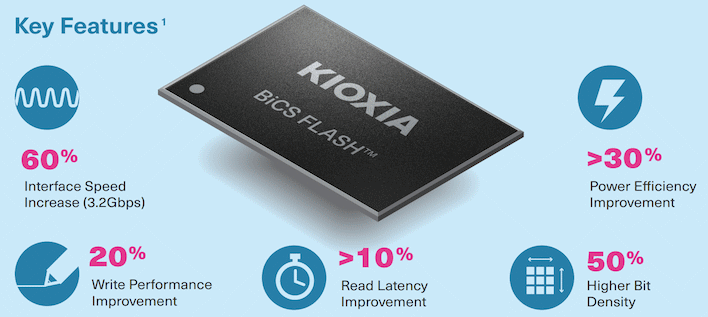Kioxia's 2Tb QLC NAND Arrives To Challenge WD For Cheaper, Higher-Capacity SSDs
Well, that day is coming quicker than you might have thought. Flash memory manufacturer Kioxia (formerly Toshiba Memory) just announced that it is sampling eighth-generation BiCS 3D memory products to its partners with a maximum capacity of 2 terabits. That's 256 gigabytes on a single piece of silicon—double the largest common capcity of 1 terabit. Kioxia proudly says that it's the highest capacity in the industry.

Kioxia says its new 2 Tbit flash memory chips can achieve 4 TB of capacity in a single package with 16 dice stacked vertically. That's one tiny flash chip on your M.2 SSD storing 4 terabytes of data. It's fast and efficient, too; Kioxia says that the write efficiency of the new flash is "approximately 70% higher than Kioxia's current QLC device," while the transfer rate of 3.6 Gbps per die is the fastest on the market.
That's not the only news from Kioxia, though. Tthe company also says that it's releasing a new 1-Tbit part that's optimized for performance rather than capacity. According to the vendor, the new speedy silicon offers 30% faster sequential writes and 15% quicker read latency compared to the just-announced 2-Tbit unit. Kioxia says this flash will be used in "high-performance applications, including client SSD and mobile."
It'll be at least a few months before we see these parts in retail products, but the prospect of M.2 SSDs with 16 terabytes of storage is quite exciting. Likewise, that performance-optimized flash finding its way to smaller drives for boot usage is also tantalizing. Hopefully Kioxia's new flash finds its way to market sooner than later.


